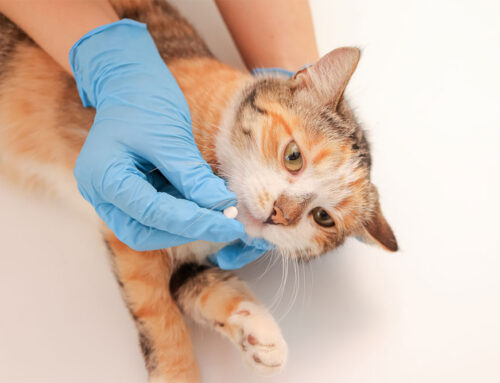What Are Seasonal Allergies in Pets?
Seasonal allergies in pets, much like in humans, can cause significant discomfort. These allergies occur when environmental allergens—such as pollen, mold, and dust mites—trigger an immune response. In Parker, Colorado, seasonal changes bring fluctuations in pollen and mold spore levels, making spring and fall peak allergy seasons for many pets.
Unlike food or flea allergies, which can persist year-round, seasonal allergies appear during specific times of the year, making diagnosis and management more predictable. Learn more about dog allergy symptoms and treatment from the AKC.
Recognizing Allergy Symptoms in Dogs and Cats
Common Signs of Seasonal Allergies in Pets
- Excessive scratching and itching
- Red, inflamed skin or rashes
- Frequent sneezing or coughing
- Watery eyes and nasal discharge
- Licking or chewing paws
- Recurring ear infections
When to Seek Veterinary Care
If your pet experiences persistent or worsening symptoms, veterinary intervention may be necessary. Severe cases of allergies can lead to:
- Chronic skin infections from excessive scratching
- Hair loss or open sores
- Severe swelling or difficulty breathing, which may indicate anaphylaxis (a medical emergency)
If you notice these signs, schedule an appointment with Parker Center Animal Clinic.
Diagnosing Seasonal Allergies in Pets
Veterinary Allergy Testing and Evaluation
Proper diagnosis ensures personalized treatment for your pet’s specific allergy triggers.
- Physical Examination & Medical History – Identifying seasonal patterns and environmental triggers.
- Intradermal Skin Testing – The most accurate test for determining specific allergens.
- Serum Allergy Testing – Measures the immune response to allergens in the blood.
Effective Treatment Options for Seasonal Allergies
Medical Treatment Options
Treatment depends on the severity of your pet’s allergies and may include:
- Antihistamines (e.g., Benadryl, Zyrtec) to reduce itching and inflammation.
- Corticosteroids for severe reactions, though long-term use requires monitoring.
- Allergy shots (immunotherapy) to desensitize the immune system over time.
Topical Therapy: Medicated shampoos, sprays, and wipes can soothe inflamed skin and remove allergens from your pet’s coat. Read more about topical therapy in allergy treatment on DVM360.
Environmental Management
Reducing allergen exposure is a key component of allergy management:
- Vacuum regularly with a HEPA filter to reduce dust and pollen indoors.
- Use an air purifier to improve indoor air quality.
- Wash pet bedding frequently to remove allergens.
- Rinse paws after walks to prevent pollen from spreading indoors.
For additional allergy management strategies, check out Allergy Tips for Small Animals – Purdue Veterinary Hospital.
Home Care Strategies to Manage Pet Allergies
Regular Grooming to Reduce Allergens
Frequent bathing can help remove allergens from your pet’s skin and coat. Proper ear cleaning is also essential, as allergies can lead to chronic ear infections. Learn how to clean your pet’s ears with this guide from Cornell University:
How to Clean Your Dog’s Ears – Cornell University Riney Canine Health Center
Additional home care tips:
- Use hypoallergenic wipes after outdoor activities.
- Apply pet-safe moisturizing creams to prevent dry, itchy skin.
- Switch to hypoallergenic bedding to minimize allergen buildup.
Learn more about the importance of regular pet grooming from the ASPCA.
Nutritional Support for Allergy Management
A well-balanced diet can strengthen skin barriers and reduce inflammation caused by allergies. Consider:
- Omega-3 fatty acids – Found in fish oil, these help reduce itching and inflammation.
- Antioxidants – Support immune health and minimize allergic reactions.
- Hydrolyzed protein diets – Designed for pets with food sensitivities that exacerbate seasonal allergies.
For more on how diet affects skin health, read Dermatitis: Nutrition’s Role in Itchy Pets – OVC Pet Nutrition.

Preventing Seasonal Allergies in Pets
Preventative care is crucial for reducing allergy symptoms and improving your pet’s quality of life.
Veterinary Preventative Care
- Annual wellness exams allow early detection of allergies.
- Allergy testing can help identify triggers before symptoms worsen.
- Year-round flea and parasite prevention reduces skin irritation from bites- learn more at The Importance of Year-Round Parasite Prevention for Pets.
Frequently Asked Questions (FAQs)
What are the most common allergens affecting pets in Parker, Colorado?
- Pollen from trees, grasses, and weeds
- Dust mites
- Mold spores
- Environmental pollutants and wildfire smoke
Can pets outgrow seasonal allergies?
While some pets may experience fewer symptoms as they age, allergies are usually lifelong conditions that require ongoing management.
Are certain breeds more prone to allergies?
Yes, some breeds have a higher genetic predisposition to allergies, including:
- Labrador Retrievers
- Golden Retrievers
- Bulldogs
- Terriers
- Siamese cats
Can changing my pet’s diet help with seasonal allergies?
A balanced diet with omega-3 fatty acids and antioxidants may help reduce inflammation and improve skin health.
What are signs of a severe allergic reaction?
- Swelling of the face or throat
- Difficulty breathing
- Excessive drooling or vomiting
If your pet exhibits any of these symptoms, seek emergency veterinary care immediately.
Contact Parker Center Animal Clinic for Allergy Relief
Managing seasonal allergies requires a combination of veterinary care, at-home strategies, and environmental modifications. If your pet is suffering from allergy symptoms, we’re here to help.
Schedule an appointment with Parker Center Animal Clinic to develop a customized allergy treatment plan.






